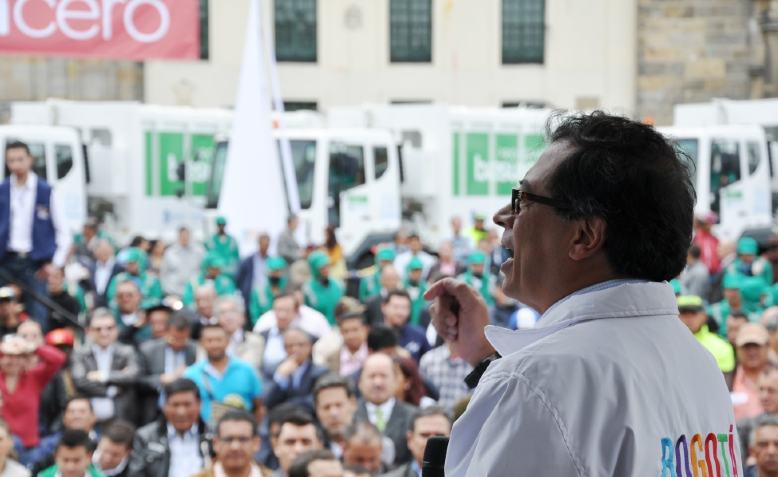 Gustavo Petro. Photo: Bogotá Humana / Flickr / CC BY-NC 2.0, license linked below article
Gustavo Petro. Photo: Bogotá Humana / Flickr / CC BY-NC 2.0, license linked below article
Left-wing Gustavo Petro’s historic victory in the Colombian elections ends decades of neoliberal rule but the left must be prepared for the challenges ahead, argues Jonathan Maunders
Colombia has elected its first leftist president, with former Bogota mayor Gustavo Petro seeing off right-winger Rodolfo Hernández in Sunday’s presidential run-off election. Petro’s triumph is a major victory for the Colombian left, ending decades of neoliberal government control.
In a heated election race, Gustavo Petro was able to pull in 50.5% of voters, beating Rodolfo Hernández, a construction magnate, by a margin of roughly 700,000 votes.
Petro was a member of the guerrilla M-19 movement during the 1980s, later being imprisoned for possessing arms, before joining the legislative opposition and serving as Bogota’s mayor.
Many believe that this experience leaves him well-placed to fully apply the 2016 peace deal agreed with the guerrilla group Farc, ending five decades of active conflict, as well as easing tensions with other rebel groups.
How did the left win?
The presidential election came amid nationwide anger at policies that have furthered existing inequalities and follows a wave of anti-government protests over the last year.
Gustavo Petro’s presidential campaign was focused on this anger, promising to reverse decades of rising inequality through pension reforms, high taxes on underused land and free university education.
Inequality is evident throughout Colombia but is particularly rife in black and indigenous communities. Petro has made radical pledges to reverse these trends and the identity of his running mate offers real hope that this will be achieved.
Not only will Francia Marquez soon become Colombia’s first ever black Vice-President, she is also a relentless human rights activist, having led opposition to illegal mining operations threatening rural communities and fighting for the Farc peace negotiations to incorporate the experience of black communities.
What now?
Petro’s election is a seismic victory for the Colombian left, but there are still many challenges ahead.
Naturally, establishment figures are predicting that Petro’s policies will lead to economic ruin and will surely look to spread such false fears in the months ahead in an effort to curb the new government’s economic radicalism.
In addition, Colombia’s congress is deeply divided with numerous parties and factions represented. It’s likely that congress will look to block Petro’s government at every turn and so it is essential the incoming president’s supporters and the wider left are prepared to take to the streets to pressure the Colombian congress to back Petro’s radical mandate.
Petro’s government will also likely face opposition and potential interference from the Biden administration in the US, particularly as he has suggested he will end years of isolating Venezuela and resume ties with Venezuelan President Nicolás Maduro. The US government are unlikely to respect this approach and may retaliate.
No matter what the weeks and months ahead, Petro’s government will face numerous threats. The Colombian left have achieved a historical victory, but they must be ready to face the challenges ahead.
Join Revolution! May Day weekender in London
The world is changing fast. From tariffs and trade wars to the continuing genocide in Gaza to Starmer’s austerity 2.0.
Revolution! on Saturday 3 – Sunday 4 May brings together leading activists and authors to discuss the key questions of the moment and chart a strategy for the left.

